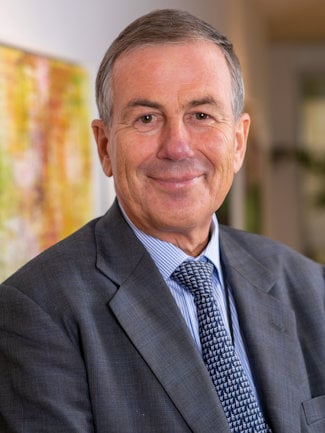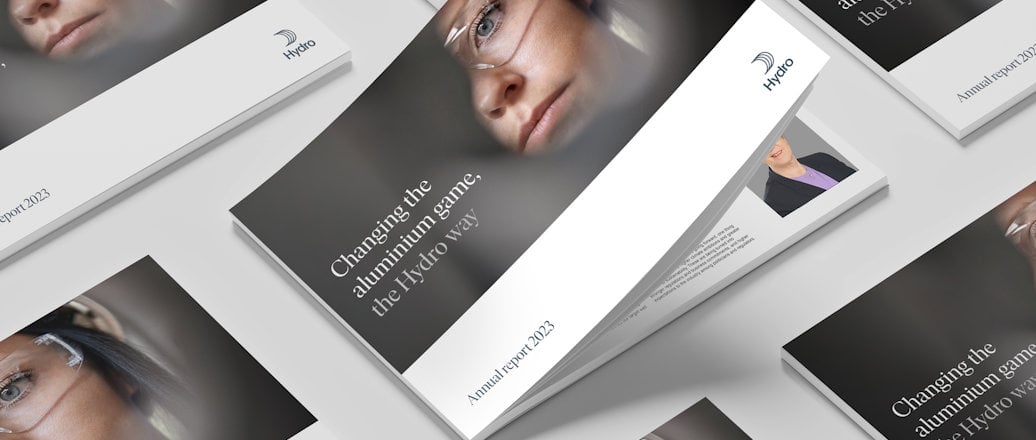President & CEO Hilde Merete Aasheim and Chair Dag Mejdell's letter to stakeholders in Hydro's 2023 annual report.


The green transition is progressing with full force and aluminium demand from sectors supporting it remains robust. To realize the low-carbon circular economy is not easy and requires bold moves, but we consider the green transition a fundamental megatrend on which we will build. Hydro is determined to pioneer the green aluminium transition, powered by renewable energy.
Our People
Hydro’s most important asset is our 33,000 colleagues across 40 different countries who make Hydro stronger and better positioned in a fast changing world. Throughout the company our people, driven by their dedication and determination, use their skills and experience, to deliver on our ambitious strategic agenda. Nurturing a diverse and inclusive workplace environment is critical to reach our targets of constantly improving our greener product ranges and practices, better cost positions, and improved market positions.
Health and safety is our top priority. Over the past years, Hydro’s safety performance has improved significantly, with lower injury rates and fewer high-risk incidents. Sadly, October 2023 represented a large setback for us, as we experienced one fatality involving a contractor at our alumina refinery in Brazil and one fatality involving a contractor at our joint venture Qatalum in Qatar. Although the fatality in Brazil is not concluded as work related and investigations of root cause are on going, two young men did not return home from work. These incidents are a stark reminder that good safety results can never be taken for granted. Safety is and must be on the top of the agenda, every day and hour in our operations, including contractors working for us. Our ultimate target is an injury free environment, for our own employees and our contractors.
Robustness and resilience
In 2023, we delivered an adjusted EBITDA of NOK 22,258 million, down from the record year of 2022, as metal prices fell on 4 percent lower primary demand in the world outside China, resulting from the current macroeconomic turmoil. In European markets for extruded products, demand fell by 17 percent year over year. Even with these changes, Hydro Extrusions delivered their second highest adjusted EBITDA of NOK 6,480 million, as growth in high-margin segments offset a large share of the volume decline.
We have worked actively on strategic capital allocation over the past years. In 2023, we made significant reallocations within the portfolio as we sold a 30 percent share of our Alunorte alumina refinery to Glencore, freeing up financial resources to be allocated into Hydro’s ambition to grow in Recycling and Extrusions. This includes the acquisition of the Polish aluminium recycling company, Alumetal, strengthening our recycling position in Europe. We were also pleased to finalize the capital raise for Hydro Rein, partnering with Macquarie Asset management for further renewables growth.
Hydro launched its improvement program in 2019, with the ambition to deliver NOK 7.3 billion by 2023. In 2020, we launched our commercial ambition which aimed to achieve commercial uplift of NOK 2 billion by 2025. The programs comprise all business areas and reflect our continuous focus on operational excellence, cost competitiveness, strong market positions, and differentiation in sustainable products. The original improvement program target was achieved in 2022, and we continue raise to our ambitions and identify new improvement opportunities.
In 2023, our improvement program achieved accumulated improvements amounting to NOK 8.8 billion annually compared with 2018 baseline. We launched a new ambition in November last year to reach NOK 14 billion in accumulated improvements by 2030.
Our commercial ambition aiming to improve results by NOK 3 billion by 2027, compared with 2018 is on track, reaching NOK 2.4 billion as of 2023. Positive developments in the markets for greener products has led us to lift the ambition to reach NOK 6.1 billion in accumulated improvements by 2030.
Within both alumina and primary aluminium production, we have low and robust cost positions in the first quartile, with ambitions to further improve.
All of the above, has supported an adjusted return on average capital employed (ARoaCE) of 11 percent over the last five years, above our target of 10 percent over the cycle. Reflecting the current volatile market environment, and a year with high growth and return seeking investments, the ARoaCE for 2023 was 7.1 percent.
Improved earnings allow for competitive shareholder returns, and since 2019, we have distributed NOK 30.7 billion to shareholders, with a proposal to pay out an additional NOK 5 billion for 2023, 59 percent of adjusted net income per share, and NOK 2 billion of share buybacks.
Greener aluminium stands out in the markets
The market for greener aluminium is growing at a high pace. Combined with the roadmap we have set out towards 2030 to pioneer the green aluminium transition, we believe in a significant value creation potential for Hydro. Our ability to utilize our integrated value chain delivering low-carbon products with a strong sustainability profile, will create value for our customers and shareholders alike.
The green transition is driving the need for critical materials like aluminium. Even in weaker markets there is a strong pull for more aluminium in segments like automotive, buildings and construction, and renewable energy infrastructure. Political and regulatory priorities in the major economies underpin demand for low-carbon solutions and renewable energy.
While aluminium helps reducing emissions in the use-phase, it also matters how aluminium is produced. What is becoming increasingly evident, is that the most ambitious players in the market are now looking beyond aluminium’s material properties. Carbon content, nature impact, and social profile of the manufacturer, are becoming more and more important.
End consumers, society at large and regulators are becoming increasingly concerned about the full value chain emissions in the products entering the market. Customers are turning to the materials market to find providers who not only can deliver aluminium with the lowest possible emissions today, but also have credible pathways towards net-zero.
Shifting the gear, changing the game for aluminium
Hydro is already a front runner offering market leading low-carbon products. Our new 2030 strategy has several paths leading towards net-zero by 2050 or earlier, stepping up our efforts to decarbonize our value chain, changing the game for aluminium.
These include clear targets and tangible milestones addressing climate, nature, and social impacts from mining, refining, and energy generation to electrolysis and extrusions as well as ambitious targets to increase our use of post-consumer scrap beyond the original target of doubling by 2025.
We are expanding in recycling in Europe and the U.S.
The acquisition of Alumetal, completed in July, supports our recycling strategy in Europe by increasing the post-consumer scrap (PCS) usage by approximately 150,000 tonnes per year.
Our greenfield Cassopolis recycling plant in Michigan opened in November 2023, and will supply the U.S. market with 120,000 tonnes of recycled extrusion ingot per year, including introducing large-scale supply of Hydro CIRCAL to the U.S. market.
Similar projects are being built in Hungary, Germany and Spain, increasing Hydro’s recycling capacity further. In addition to investments in capacity, we are investing in developing our scrap sorting technology to be able to dig deeper into the scrap pile. This will allow us to recycle even more low-grade scrap and enhance margins while doing it.
We are expanding in aluminium extrusions
The green transition is creating unforeseen market opportunities that were not apparent just a few years ago. This includes the comprehensive transformation of the entire automotive supply chain to serve the transition towards electric mobility, and the growing solar sector where aluminium is preferred for mounting systems and frames. We are positioning ourselves towards expected growth in demand for low-carbon aluminium solutions. Our ambition is to turn our portfolio from general extrusions to strengthen our supply in high end segments of extruded aluminium, increasing investments accordingly.
The acquisition of the German company Hueck, completed last March, strengthens Hydro Extrusions’ offerings in the European market for building systems and extruded solutions. Additionally, our investments in new presses in Nenzing, Austria and Rackwitz, Germany, last year further strengthens our position in the market.
We are stepping up ambitions within renewable energy
With more than 70 percent of our primary aluminium production covered by renewable power, we have a very good starting point for low-carbon aluminium. Renewable energy at competitive cost is the most important enabler for our low-carbon aluminium position. Having the capabilities to develop, operate, and manage renewable power production at scale, in-house, is a significant advantage for Hydro.
Towards 2030 we will expand and upgrade some of our existing hydropower plants in Norway, and also look into new projects, including pumped power stations, to seize peak prices and capitalize on the growing value of capacity for flexible power production. In Norway, we have initiated new land based wind and solar projects in partnership with other renewable energy developers through Hydro Energy.
Hydro Rein is our main vehicle to ensure the development of renewable energy for decarbonizing our own and other industries at affordable cost. Over the past years, Hydro Rein has developed a significant portfolio of renewable energy projects and contracts with industrial off takers. The Hydro Rein partnership with Macquarie Asset Management secures a USD 300 million capital raise to finance and accelerate projects in the Hydro Rein pipeline. The current 6.9 GW portfolio pipeline in the joint venture (gross capacity) consists of renewable energy projects from projects both under construction and in early stage development in the Nordics and Brazil.
We are executing our ambitious decarbonization roadmaps and stepping up to contribute to nature positive and just transition
Going forward, we will continue on our path towards net-zero, chasing the carbon out of our processes with full force. Simultaneously, we will step up our contribution to a nature-positive future and a just transition.
Towards 2030 Hydro maintains our ambition of 30 percent reduction in GHG emissions, targeting net-zero by 2050 or earlier. An important milestone on this journey will be to demonstrate emission free smelting technologies that can produce near-zero aluminium at an industrial pilot scale by 2030.
In Bauxite & Alumina, we are executing on our fuel switch project in Brazil. Liquified natural gas will replace fuel oil, reducing CO2e emissions by 700,000 tonnes a year. The transition to gas will take place during the first half of 2024. The next step is to replace coal fired boilers with electric heating. The first electric-boiler is in operation and the next two will be operational by the end of 2024, reducing CO2e emissions by an additional 400,000 tonnes a year.
The most challenging part is to get the carbon out of our electrolysis processes. Here we are pursuing two paths. The first path is to test technology for capturing CO2 from our low-concentration off-gas with the goal of first CO2 capture by 2024 and demonstrating this in industrial pilot scale by 2030.
The second path is to develop a new smelter technology. Our own HalZero technology project aims to eliminate carbon emissions from both electrolysis and anode baking in primary aluminium production, keeping CO2 in a closed loop to avoid emissions. In December, Hydro took a bold decision to construct a test facility for the zero-emission HalZero technology, with the aim to produce first metal by 2025.
Our decarbonization efforts are addressing all sources of emissions, also in the casting process.
- On a trial basis, we have started using more recycled material as “cold metal” to lower the carbon footprint in casted products.
- To further reduce casthouse emissions, in Sunndal, Norway,we are testing the use of biomethane to replace fossil energy.
- Also, in Sunndal, Hydro is testing plasma technology to replace fossil fuel with electric heating in the casting process.
- In Navarra, Spain, Hydro Havrand ran a successful pilotusing green hydrogen as the source of process heating.
Sustainability is more than climate. Nature and social responsibility have become increasingly important, with expectations from all stakeholders on the rise.
In August 2023, Hydro announced its conformance with the Global Industry Standard on Tailings Management (GISTM) in line with the company’s commitment to implement the standard. At Paragominas, the Tailings Dry Backfill method puts dried leftovers from bauxite mining back in mined areas before they are rehabilitated and reforested. This eliminates the need to build new permanent tailings dams and supports our ambitions to protect biodiversity.
In Hydro, we are committed to improving lives and livelihoods in the local communities where we operate. We respect and promote human rights through continuous dialogue as well as due diligence processes to identify and mitigate potential human rights risks. Our community surveys show continuous improvement following a number of social initiatives in the local communities.
In 2023, we started to implement our Just Transition framework. Supporting and respecting human rights is at the core of this framework, so is education. Long-term support to initiatives strengthening people's basic rights like Sustainable Barcarena Initiative (SBI), TerPaz (local community centers) and building a technical school in Barcarena, are all examples of how we contribute to improve lives and livelihoods locally. Our target is to upskill 500,000 people by 2030 through community programs and partnerships. As of 2023, more than 197,000 people have benefitted from education and training programs supported by Hydro.
Working to improve industry standards for human rights, transparency and responsible production, we are engaging with a range of international organizations. Hydro is a signatory member of the UN Global Compact and a committed member of the Aluminium Stewardship Initiative (ASI).
Receiving the Mercedes-Benz sustainability supplier award in June 2023 is an important recognition of our sustainability work from a high[1]end customer, renowned for setting strict human rights and sustainability requirements for their suppliers.
Hydro is committed to applying ethical business practices and compliance throughout its organization and supply chain. In 2023, Hydro’s score improved further on several important ratings related to Environmental, Social and Governance (ESG).
We are shaping the markets for greener aluminium
During the past two years ambitious players like Mercedes-Benz, Polestar, Porsche and Volvo Group have teamed up with Hydro to decarbonize their future vehicle production. These partnerships represent a new business model where the traditional supplier and purchaser relationship has evolved into a strategic cooperation on common objectives.
Hydro is in a unique position because we are one of very few fully integrated aluminium companies in the world. With the full aluminium value chain in-house, we can provide our customers with full traceability and transparency from when the bauxite is mined until the finished extruded solution. We are already in the market with leading renewable energy based low-carbon aluminium, and recycled offerings. This is not going unnoticed among our customers where we are experiencing a systemic shift, with a pull to secure ultra low-carbon materials, accompanied by an increasing willingness to pay a premium for best-in-class materials. Based on these developments and our determination to take a leading role, we have set an ambition to deliver an additional NOK 2 billion in greener earnings uplift by 2030.
In November, Hydro joined the First Movers Coalition to accelerate the green aluminium transition. The idea behind the initiative is to use the member’s purchasing power to create early markets for innovative clean technologies across hard to abate sectors, which will help suppliers overcome what is currently a major hurdle for the green transition by softening the most serious risks and costs of innovating and investing. This is a practical example of how it is possible to enable competition based on sustainability credentials rather than just cost.
Hydro has a unique position to succeed in a new reality
At our Capital Markets Day last November, we launched our updated strategy with the ambition of making Hydro the industry front runner in the greener aluminium transition. Hydro is in a robust position. We are low on the cost and emission curves compared to our peers. Combined with our long-term renewable power contracts, we are able to handle the short-term market downturn, without losing sight of the long-term opportunities.
Supported by a solid financial framework, ensuring financial strength and flexibility, we can do just this, while at the same time enabling competitive shareholder distribution, remaining true to our dividend policy and capital structure target.
We have delivered strong relative shareholder returns since 2020, and we are confident that Hydro is uniquely positioned to continue generating value in this new reality. We look forward to continuing our legacy of building industries that matter by pioneering the green transition and creating value for all our stakeholders.
Updated: May 15, 2024
